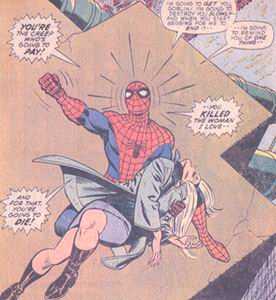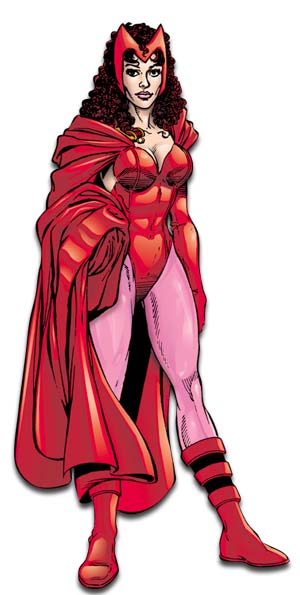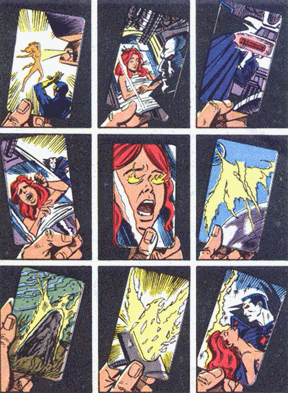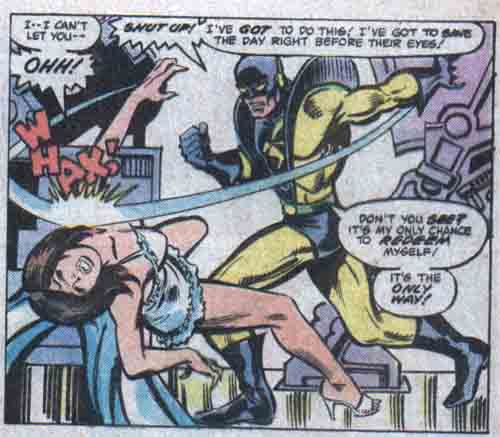Stacy
and
Scarlet Shamed
Thoughts on Marvel’s belittling of
Gwen Stacy and the Scarlet Witch
July 18, 2005
By Avi Green
Last year, when looked at under a microscope, was truly no biggie
for either Marvel or DC. Just more and more overhyped “events” that
in the end, were not worth the paper they were printed on, whether
it be Avengers Disassembled,
Identity Crisis, Batman: War Games, or Amazing Spider-Man: Sins
Past. Just a whole lot of baloney that people simply don’t
and won’t want to be bothered with.
In discussion here will be Marvel’s needless little duds, namely the
ones that defamed Gwen Stacy and Wanda Maximoff, alias the Scarlet
Witch. Gwen gets defamed out of political correctness, and Wanda for
the purpose being used as a plot device in another needless
crossover called House of M. (Which stands for what? Even now, the
exact answer escapes me.)
 When Gwen bit the bullet back in
1973, her life taken from her by the Green Goblin, who knocked her
off the George Washington Bridge in New York City, it may not have
been the wisest move made by then writer Gerry Conway, since maybe
he or another write could have developed her past the sad
personality she had when first introduced in 1965, but it did at
least establish an impact on Spider-Man, and it’s one of the very
few stories of its sort in comics that’s proven effective, here, in
providing a significant change in the characters in Spidey’s world.
When Gwen bit the bullet back in
1973, her life taken from her by the Green Goblin, who knocked her
off the George Washington Bridge in New York City, it may not have
been the wisest move made by then writer Gerry Conway, since maybe
he or another write could have developed her past the sad
personality she had when first introduced in 1965, but it did at
least establish an impact on Spider-Man, and it’s one of the very
few stories of its sort in comics that’s proven effective, here, in
providing a significant change in the characters in Spidey’s world.
If anything, the audience was able to appreciate Gwen for how
innocent she was, even in death. Mind you, by saying she’s innocent,
I don’t mean say, that she was ever a virgin, and even in the comics
back then, it’s not as if it were never truly implied that she and
Peter didn’t ever have sex together, but that she was a very honest,
and very sincere young lady, who was certainly admirable for being
that way, and her death helped to reinforce that image of herself.
So why go along and tarnish her image years after her death by
claiming that she never had sex with Peter, but did have sex with
Norman Osborn, and implying that her clone (from 1975) gave birth to
a pair of twins?
Sadly, that was the whole insulting premise of J. Michael
Straczynski’s story arc in Amazing Spider-Man in late 2004, and I
shouldn’t have to point out that it was by far one of the stupidest,
most atrocious ideas that Marvel, even post-Jemas, could have come
up with. Maybe not as bad as Identity Crisis ever was, but it still
left me with a very bad taste in my mouth. We find out that Gwen
wasn’t the good, young innocent girl she was thought to be up until
then, but that she supposedly took pity on Norman Osborn, whom
experts on Spider-history know was not exactly the most hospitable
to outsiders, and was usually distrustful of women, and ended up
having a tryst with him. And this ends up making her pregnant just
shortly before her death, and as a result, the aforementioned clone,
gave birth to twins, whom Norman then exploits years later to use as
weapons against Spidey.
Shock value premise aside, what’s implausible about that premise is
that Straczynski claims in it that Gwen never had sex with Peter,
which only makes it all the more hard to believe that she would
actually have “taken pity” upon a man whom even she didn’t think
much of, and only serves to tarnish her image even more.
Furthermore, as it so happens, while it may not have been overtly
implied that Gwen and Peter were having sex, the posibilities were
still there, and you could tell that it was always likely that they
did have sexual relations, whether they were many or just a few. So
what’s Straczynski getting at anyway?
This is in simple terms, just another of Marvel’s own attempts at
sales-through-controversy. And to answer the question of why they
would tarnish Gwen’s image more throughly, it’s also because of the
sad staple of disrespect for classic stories and characters of yore
that’s been going around, possibly ever since the turn of the
century.
Add to that the additional smearing of Mary Jane Watson-Parker by
making her look like a liar or as if she were hiding something from
Peter when she tells him about what she supposedly knew took place
back then, and this really ends up becoming one of Marvel’s worst
fiascos in recent memory. And this is exactly why, no matter what
the level of writing turns out to be in Spidey, or even in Fantastic
Four, which Strazcynski was assigned to write recently, from here
onwards, JMS has got to go.
I sure hope that Peter David, who’s been assigned to write a new
Spidey spinoff, will make his book worth the trip, and the money.
 Then, we have Disassembled’s
defamation of Scarlet Witch, one of the most appealing anti-heroines
Stan Lee created back in the mid-60s, courtesy of Brian Michael
Bendis, whose popularity seems high with certain audiences, but
whose own understanding and affection for the MCU and its
protagonists is iffy. It seems however, that he may not have made it
any secret that he disliked some of the popular characters,
including Hawkeye, whom he ostensibly has Wanda kill off – are you
ready for this? – because she’s insane. Just like Jean Loring! And
to make matters worse, Bendis even said that he was “inspired” by
one of John Byrne’s worst storylines from the time that he was
writing West Coast Avengers in 1990, in which Wanda went insane
after her children of the time turned out to be products of her own
ability to warp reality, and turned to the bad side for a time.
Then, we have Disassembled’s
defamation of Scarlet Witch, one of the most appealing anti-heroines
Stan Lee created back in the mid-60s, courtesy of Brian Michael
Bendis, whose popularity seems high with certain audiences, but
whose own understanding and affection for the MCU and its
protagonists is iffy. It seems however, that he may not have made it
any secret that he disliked some of the popular characters,
including Hawkeye, whom he ostensibly has Wanda kill off – are you
ready for this? – because she’s insane. Just like Jean Loring! And
to make matters worse, Bendis even said that he was “inspired” by
one of John Byrne’s worst storylines from the time that he was
writing West Coast Avengers in 1990, in which Wanda went insane
after her children of the time turned out to be products of her own
ability to warp reality, and turned to the bad side for a time.
Naturally, whatever Bendis is trying to say, there are more than
enough inconsistencies for the sake of “big events” and especially
sales, including the way that the heroes act as incompetently and
out-of-character as the ones in Identity Crisis, and the script at
one point even makes an insulting reference to that infamous
storyline from 1981, when Hank Pym smacked Janet Van Dyne, and his
act there became embarrassingly inflated over the years in
progressing stories. (Tony Stark, pointlessly drunk, says to Hank,
“don’t you got a wife to beat?”) And even if Wanda was sad about not
having been able to bear real children then, she got over it, and
she most certainly isn’t desperate to be a mother at any cost. And
she’s learned how to hone her skills to perfection over the years,
so it’s not like she would become dangerous all of a sudden and lose
control over them.
Most importantly of all though is that, like Jean Loring and Mary
Jane Watson, she’s also been a girl who knows, and certainly
learned, how to think for herself, and always knew what she wanted.
Which perfectly explains why the premise Bendis wrote for the story
is, as Silver Bullet Comics pointed out – sexist.
And, come to think of it, that’s exactly what even Straczynski’s
take on Gwen Stacy – and even Mary Jane Watson – is too.
So anyway, whatever appeal Straczynski and Bendis may have to some,
it does not extend to me. Basically, they’re both overrated writers,
doing it for little more than their own personal vanity and what
they consider art, and little more. And that’s one more reason why I
won’t be reading their stuff.
Did we really need the Phoenix
story?
 Say I'm a sell-out if you will, but I
have a position on the Phoenix story in Uncanny X-Men from 1979 far
different than most: I dislike it.
Say I'm a sell-out if you will, but I
have a position on the Phoenix story in Uncanny X-Men from 1979 far
different than most: I dislike it.
The reason for that isn't neccasarily due to the fact that Marvel
did something not usually seen back in those days, by killing off a
leading character. No, it's because of the fact that they turned
Jean Grey into a stereotype before doing it.
Peter
Sanderson once opined that he thought that it was a great
story. But that's one thing where I'll have to disagree with him,
and point out that the problem with the story is that it reeks far
too much of something he mentions in another
column of his: the stereotypical idea that "women can't cope
with power."
Simply put, that's the problem I personally find in the whole
Phoenix saga, and it overwhelms the premise that Chris Claremont and
John Byrne were supposedly using back in the late 1970s, which was
"power corrupts".
Now don't get me wrong here. Of course there are plenty of women
who've falled victim to the influence of power corrupting their
minds over the years. But the fact is that Jean Grey was seemingly
overcome by science-fiction forces, that being cosmic energy, and
that's way different. Not to mention that the whole lurid notion of
a beautiful woman being turned into a planet killer is something
that owes more than a bit to the Brothers Grimm, and that's not
something I need cluttering up my favorite literature.
To make matters worse, as Sanderson points out in his 58th column at
IGN:
"One
important
exception is the (first) death of Phoenix. Chris Claremont and
John Byrne did not intend to kill Jean Grey, but editor in chief
Jim Shooter decreed that she must pay for her crimes as the
insane Dark Phoenix. Claremont and Byrne keep the focus on Jean
in her death scene, as she heroically commits suicide rather
than revert to Dark Phoenix and endanger the universe once more.
It is Jean who is most important in this story, not her lover
Cyclops, and her death became genuinely tragic. In contrast, as
a friend of mine pointed out, when Grant Morrison (temporarily)
killed off Jean a second time, she was merely a victim. And a
man's victim."
I may not agree with his opinion of the original Phoenix story, but
at least he and his colleagues have one thing right: Mr. Morrison's
only achievement in rehashing the whole hogwash of yore in New X-Men
was that he killed Jean off without genuine feeling. Because it had
to be done, didn't it? Rather than to try and work out some real
purpose and development for Jean Grey, he kills her off, proving
that he never came on board the book out of genuine devotion or
affection for the characters to begin with. And if he doesn't have
any genuine love for the characters any more than Bendis does, then
why bother to write their books and adventures?
As bad as Avengers: Disassembled was, the whole degradation of women
as being unable to cope with power is something that's been
excercised long beforehand. Anyone put off by Wanda's degradation
should take a good look at the Phoenix saga as well to see what it's
like for girl characters to end up being cheaply degraded.
The backhand smack in the face?
 I don’t know if this has ever
crossed anyone else’s mind, but, did anyone else who's familiar with
the horrors of Identity Crisis get the feeling that Brad Meltzer was
indirectly insulting Janet Van Dyne, the Wonderous Wasp, when he
writes Jean Loring as inviting Ray Palmer to hit her in the seventh
and last issue of IC?
I don’t know if this has ever
crossed anyone else’s mind, but, did anyone else who's familiar with
the horrors of Identity Crisis get the feeling that Brad Meltzer was
indirectly insulting Janet Van Dyne, the Wonderous Wasp, when he
writes Jean Loring as inviting Ray Palmer to hit her in the seventh
and last issue of IC?
Thinking back on that part now, it does almost seem that way to me,
as I was reminded very chillingly of that time in 1981 when Hank
Pym, so determined to redeem himself, smacked his then wife Jan hard
enough to knock her over.
And what really makes that scene in IC so distasteful is that it
legitimizes exactly what was wrong of Hank Pym to have done then, by
hitting his lovely wife Jan. And worst of all, it gives a very bad
image to DC and Marvel alike, by making them look as if they’re
willing to go all the way for the cheap, by resorting to
legitimizing wrongful violence against women in comics.
With that in mind, is it any wonder so few women actually read
comics these days?
Copyright 2005 Avi Green. All
rights reserved.
 When Gwen bit the bullet back in
1973, her life taken from her by the Green Goblin, who knocked her
off the George Washington Bridge in New York City, it may not have
been the wisest move made by then writer Gerry Conway, since maybe
he or another write could have developed her past the sad
personality she had when first introduced in 1965, but it did at
least establish an impact on Spider-Man, and it’s one of the very
few stories of its sort in comics that’s proven effective, here, in
providing a significant change in the characters in Spidey’s world.
When Gwen bit the bullet back in
1973, her life taken from her by the Green Goblin, who knocked her
off the George Washington Bridge in New York City, it may not have
been the wisest move made by then writer Gerry Conway, since maybe
he or another write could have developed her past the sad
personality she had when first introduced in 1965, but it did at
least establish an impact on Spider-Man, and it’s one of the very
few stories of its sort in comics that’s proven effective, here, in
providing a significant change in the characters in Spidey’s world. Then, we have Disassembled’s
defamation of Scarlet Witch, one of the most appealing anti-heroines
Stan Lee created back in the mid-60s, courtesy of Brian Michael
Bendis, whose popularity seems high with certain audiences, but
whose own understanding and affection for the MCU and its
protagonists is iffy. It seems however, that he may not have made it
any secret that he disliked some of the popular characters,
including Hawkeye, whom he ostensibly has Wanda kill off – are you
ready for this? – because she’s insane. Just like Jean Loring! And
to make matters worse, Bendis even said that he was “inspired” by
one of John Byrne’s worst storylines from the time that he was
writing West Coast Avengers in 1990, in which Wanda went insane
after her children of the time turned out to be products of her own
ability to warp reality, and turned to the bad side for a time.
Then, we have Disassembled’s
defamation of Scarlet Witch, one of the most appealing anti-heroines
Stan Lee created back in the mid-60s, courtesy of Brian Michael
Bendis, whose popularity seems high with certain audiences, but
whose own understanding and affection for the MCU and its
protagonists is iffy. It seems however, that he may not have made it
any secret that he disliked some of the popular characters,
including Hawkeye, whom he ostensibly has Wanda kill off – are you
ready for this? – because she’s insane. Just like Jean Loring! And
to make matters worse, Bendis even said that he was “inspired” by
one of John Byrne’s worst storylines from the time that he was
writing West Coast Avengers in 1990, in which Wanda went insane
after her children of the time turned out to be products of her own
ability to warp reality, and turned to the bad side for a time. Say I'm a sell-out if you will, but I
have a position on the Phoenix story in Uncanny X-Men from 1979 far
different than most: I dislike it.
Say I'm a sell-out if you will, but I
have a position on the Phoenix story in Uncanny X-Men from 1979 far
different than most: I dislike it. I don’t know if this has ever
crossed anyone else’s mind, but, did anyone else who's familiar with
the horrors of Identity Crisis get the feeling that Brad Meltzer was
indirectly insulting Janet Van Dyne, the Wonderous Wasp, when he
writes Jean Loring as inviting Ray Palmer to hit her in the seventh
and last issue of IC?
I don’t know if this has ever
crossed anyone else’s mind, but, did anyone else who's familiar with
the horrors of Identity Crisis get the feeling that Brad Meltzer was
indirectly insulting Janet Van Dyne, the Wonderous Wasp, when he
writes Jean Loring as inviting Ray Palmer to hit her in the seventh
and last issue of IC?